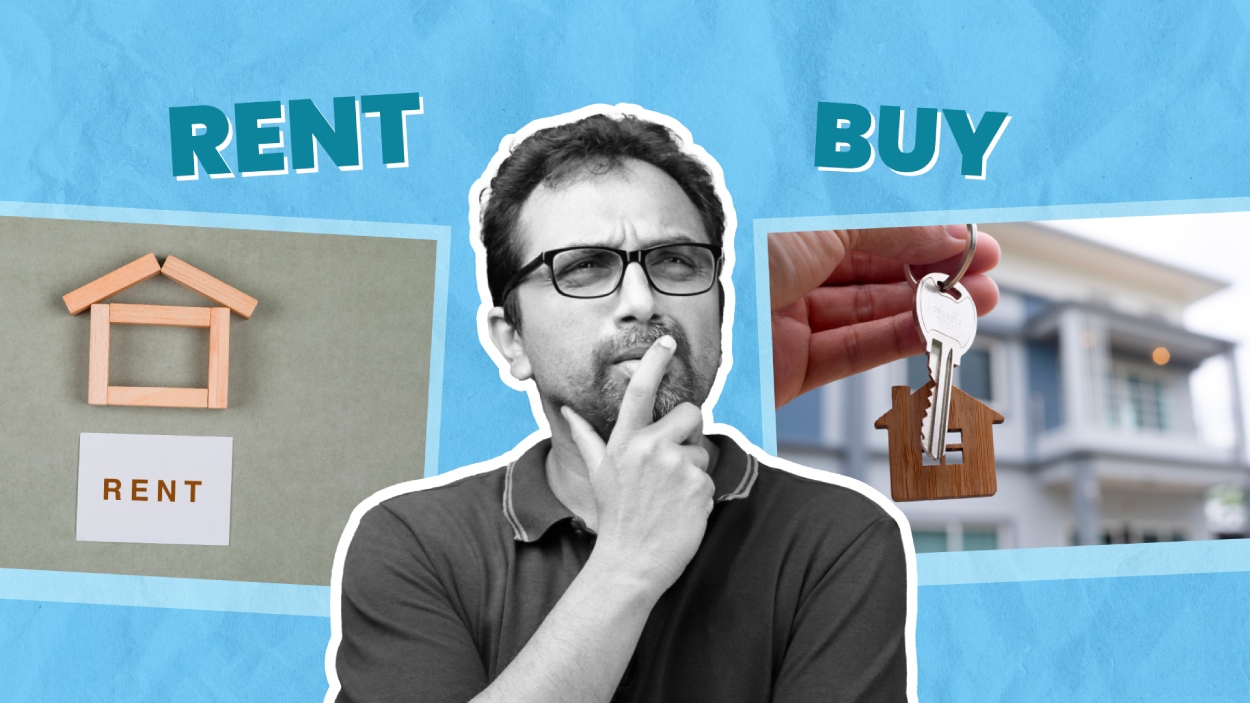Purchasing a home has traditionally been connected with settling down. However, it includes important financial decisions, we must be more realistic about our capabilities. The debate about owning versus renting a property appears to be pointless. It is a matter of choice and affordability, not of being right or wrong. In this blog, we examined both solutions in depth and addressed a few frequently asked questions.
How Risky Is It to Buy a Home?
Here are some risks associated with buying a home as an investment:
1) Being in debt for a long time: Owning a home provides security but comes at a high cost. You will almost certainly take out a loan to purchase one, putting you in debt for decades. EMI payments will consume a significant portion of your income.
2) Risk of default: If you’ve taken out a loan, your ability to pay EMIs on time is critical. If you fail to make the payments, the consequences are severe. The bank will take possession of the property, and your credit score will suffer as a result. You may also be unable to acquire a home in the future, or if you can, the interest rates and terms will be unfavorable.
3) Obsolescence: When you own a home, it is your job to keep it up to date with market standards; otherwise, you may lose money when you rent it out or sell it.
Factors that favor Buying:
1) Stability: When renting, you are constantly concerned about rental increases or the possibility that your landlord will decide to sell the house. You don’t have to worry about such things if you live in your own home.
2) Making Improvements: When you own a home, you can customize your bathrooms, create a modular kitchen, and even paint your walls orange or yellow. If you live in a rented residence, you must follow all the conditions imposed by the landlord.
3) Capital Appreciation: Because India is a developing nation, prices will rise in the long run as income levels rise. If you do not buy now, the same home may be out of your price range later.
4) Forced Savings: When you decide to buy a home, you force yourself to save for the large down payment, and then you save indirectly when you pay down the mortgage.
How risky is it to rent a house?
1) No Asset Ownership: The biggest disadvantage of renting is the lack of ownership and autonomy over the property that could have been an asset. Renters have limited influence over the property and must follow the landlord’s rules; also, you are not the owner of the property (asset).
2) Rental Increases Yearly: Your rent is expected to increase by at least 5-8% per year, possibly as much as 10% every 11 months, or as specified in the rental agreement. Loan EMIs, on the other hand, do not have to rise every year, especially if they are fixed. Furthermore, loan EMIs might be reduced when house loan rates fall.
3) Rentals are a lifetime liability: Unlike loan EMIs, which are just for a set length of time based on your tenure. That is why living forever on rent is a lifetime burden as opposed to a home loan EMI, which not only ends when the tenure finishes, but you can also prepay the loan when you have surplus income.
4) Headache of Regular Shifting: When you live on rent year after year, you are at the mercy of the landlord, and their decision to sell or end your rental housing can result in you transferring houses frequently, which is also beyond your control. All of this will not only offer you the ongoing hassle of moving homes, but will also cause you to spend shifting expenditures on a regular basis.
Why is renting a house preferred?
1) Economical option: Due to the escalating cost of real estate and other expenses, most people do not prioritise purchasing a home. Many working professionals discover that their income remains constant despite increased expenses. Furthermore, your rent is far lower than your EMIs. While this varies by city, it is common in most urban locations. This comparison must be made before deciding whether to buy or rent.
2) Less expensive costs: Buying a home entail numerous expense. But you don’t just give EMIs. The first thing that affects your financial status is the down payment. This is a fraction of the overall cost of reserving the space for yourself. Depending on the circumstances, you may additionally incur legal fees as well as other commissions and costs imposed by your bank.
Tax Benefits on Housing Loan- Section 80C
For the principle paid, a tax deduction of up to 1.5 lakh can be claimed.
This may include stamp duty and registration fees, but it can only be claimed once.
Tax Benefits on Housing Loan
Tax Benefits on Housing Loan
| Section 80C | • For the principle paid, a tax deduction of up to 1.5 lakh can be claimed. • This may include stamp duty and registration fees, but they can only be claimed once. |
| Section 24 | • There is a limit of 2 lakh rupees for interest deductions. • These discounts are only available for properties that are completed within five years. • If it is not completed within this time span, you can only claim up to 30,000. |
| Section 80 | • Every fiscal year, first-time home buyers can claim an extra 50,000 on interest amount. • The loan amount cannot exceed 35 lakhs. • The property must be worth less than 50 lakh. |
However, because interest makes up the majority of your EMI in the first few years of your loan, you won’t be able to claim the whole Rs. 1.5 lakh benefit under Section 80C. Assuming you are in the 30% tax bracket, the tax savings on the interest paid will be roughly Rs 60,000.
The Case of Renting – No Debt, HRA Tax Benefit
So, living on rent for the first few years will give you a chance to sort out your finances and save some money for a down payment on a property. You can also claim the tax benefit on your House Rent Allowance (HRA) if you live on rent.
How is HRA calculated?
The amount of HRA is less than the sum of the following:
- HRA provided by an employer
- Actual rent paid less 10% of basic monthly wage
- If the taxpayer lives in a metropolitan area, he or she will receive 50% of the base salary.
- 40% of basic salary if the taxpayer lives in a non-metropolis
Because the lowest of the above is tax-free. As a result, it is usual for employers and employees to structure salaries in such a way that the maximum tax exemption can be obtained under this heading.
Final Verdict
Finally, whether you rent or buy a home will be determined by your existing financial situation and priorities.
In general, renting might be a good option for someone looking for a short-term solution until they are financially capable of contributing a down payment and repaying the home loan EMIs without sacrificing other life goals.
When considerations such as larger tax benefits, the flexibility to stay in the property for as long as you like, social standing, asset ownership, and so on are considered, the benefits of owning a home tend to outweigh those of renting in various ways.
However, based solely on the case scenarios mentioned in this rent vs. buy computation, renting turns out to be less expensive than owning a property.




